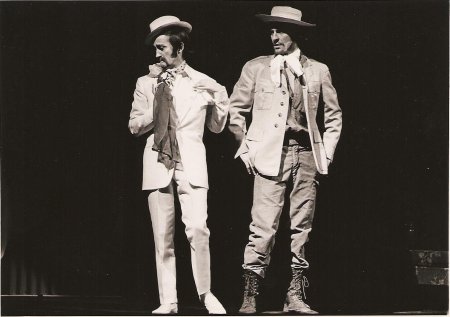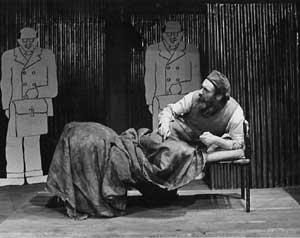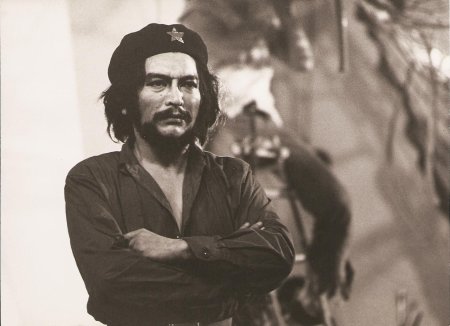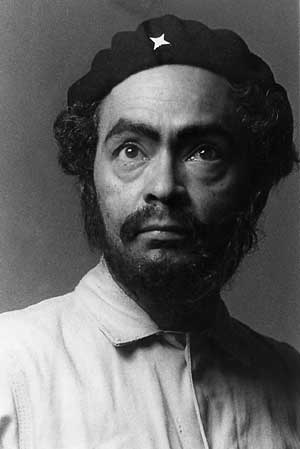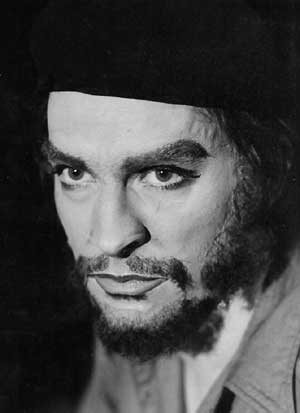MacRune's Guevara
Che Guevara was still alive in the Bolivian jungle when John Spurling
began writing this play about him, but dead and transformed into a world-famous
revolutionary icon by the time it was finished.
MacRune's Guevara was first performed in February, 1969 by the National
Theatre Company of Great Britain with a star cast including Jeremy Brett
– later best known for his television role of Sherlock Holmes – as Che,
Derek Jacobi, Robert Stephens, Jane Lapotaire, Ronald Pickup and Charles
Kay, directed by Frank Dunlop and Robert Stephens.
The theatre critic of The Daily Telegraph, John Barber, wrote at the
time: "The technique of this witty play recalled to me one of Che's
own maxims: 'Constant movement, constant mistrust, eternal vigilance'.
The author does not commit himself: he moves with speed from mistrust
of all Che stood for to an eloquent statement of his romantic appeal.
Draw your own conclusions, if you can... Like the writers who have influenced
him, Pirandello and Borges, the new dramatist dazzles the audience with
the speed of his transitions."
Although it had glowing notices from the press and packed audiences,
the play met problems, one of which is reflected inside the play itself
in the words of a rebellious actor:
"This play is in terribly bad taste. Putting on stage a man who is
a hero to millions, only just dead. And you make him out to be some sort
of mad gangster."
Most of those words were actually spoken during rehearsals to the play's
director, Frank Dunlop, by the well-known theatre critic Kenneth Tynan,
the National Theatre's dramaturg, and in a letter to Hank Diers, who recently
directed the play at Susquehanna University in the United States, John
Spurling explained:
"Tynan did not want the play to be performed - not surprisingly,
since much of it was aimed directly at him, the very model of radical
chic. But it's quite hard to remember now how very violently such people
felt at the time about the virtues of social revolution, even though they
themselves enjoyed all the comforts of capitalism. The extra irony was
that Tynan himself was at that very time producing a play in the commercial
West End of London - called Soldiers - whose main idea, for which there
is no historical evidence, was that Winston Churchill conspired to murder
the Polish leader General Sikorski.
"So Tynan didn't mind about travestying 'a hero to millions', so
long as the hero was right-wing.
When taxed with this by Frank Dunlop, the director, Tynan replied that
the play he was producing was completely serious, whereas mine was mocking
and laughing. He didn't seem to notice – or perhaps he did but didn't
care to admit it – that my play was not really aimed against Che Guevara
at all – indeed was ultimately partly in sympathy with him - but only
against those who made use of Che for dubious purposes of their own."
Soon after its British premiere MacRune's Guevara was performed in Stuttgart,
Germany. From another letter to Hank Diers:
"That first German production, in autumn 1969, ran into more of
the radical chic problem that I'd encountered with Tynan at the National.
It was bought by the then director of the Stuttgart Theatre, Peter Palitsch
- a pupil of Bertolt Brecht - who had left East Germany and come to the
West, but retained his socialist principles, even though he drove a Porsche
and dressed in the then equivalent of Armani suits. However, when I went
to Stuttgart for rehearsals, I discovered that he had decided not to do
it after all.
"It turned out that he had not understood it properly in English
and it was only when it was translated for him by his dramaturg that he
realised it was not pure hagiography for the great revolutionary hero.
I was whisked straight from the airport into the green-room, where the
whole theatre company was assembled, plus an American serviceman from
the nearby base to interpret. I argued for about three hours that it was
not anti-Che, even if critical of his supporters, that plays were not
improved by being propaganda and that, in any case, I hadn't forced the
play on them, they had bought it.
"The upshot was that I won over the actors, but not Palitsch himself,
though he conceded that his dramaturg, who liked it very much, could direct
it if he wished. None of the actors, however, was willing to play the
evil right-wing Edward Hotel [the supposed author of the text who appears
on stage to introduce and direct it], so they hired an actor from the
commercial theatre to do that part and because he did have right-wing
views - or at least not left-wing - they virtually ostracised him throughout
the production. So the reality behind scenes was astonishingly like the
fiction in front.
"Finally it opened, but Palitsch meanwhile (the director of the
theatre) had slipped texts to the students of Stuttgart University, notices
had appeared on boards warning of this fearful right-wing takeover of
a good socialist-orientated theatre, and several rows of seats on the
first night were filled with students ready to barrack and already knowing
the text.
"The actors behaved magnificently - they were completely loyal to
the play, which they had now grown to like - and they fought the claque
in the audience from start to finish. It wasn't quite a riot, but nearly,
and the good German bourgeoisie of Stuttgart sitting in the front stalls
was completely bewildered. I had to appear on stage at the end, as is
the custom in German theatres for authors at premieres, and although the
boos perhaps outweighed the applause, it was an extremely exhilarating
experience. The critics, at great length, hated it, and it was not kept
on long.
"Edward Hotel, by the way, got his name from a seedy looking place
near Paddington Station in London. It later caught fire, was rebuilt and
renamed."
There have been many productions of MacRune's Guevara in many countries,
including Greece, France, Israel, Australia, the US and Japan, but to
judge by the production photos the stage Che, whatever his nationality,
always looks - with his iconic beard and beret - just like the real Che.
|
